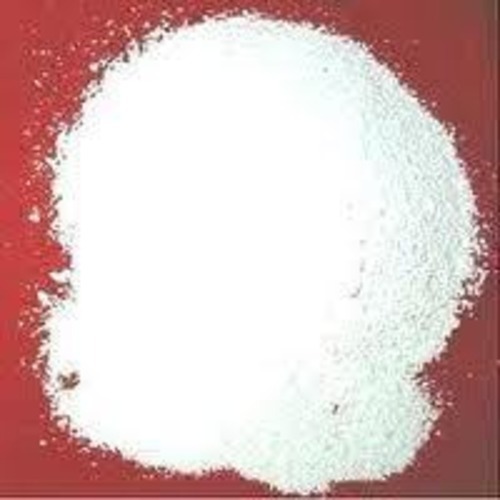Product Description
We are one of the leading manufacturers and suppliers of highly pure Lithium Citrate Tetrahydrate which physically appears as a white colored crystalline powder with a slight sweet taste. The chemical formula of this compound is Li3C6H5O7.4H2O with a chemical formula of 281.98 grams per mol. It shows good solubility with water to prepare aqueous solution. It is commonly used for the preparation of medications that are used for the treatment of mental conditions such as mania, depression, and bipolar disorder. It functions by affecting certain neurotransmitters in the brain. Buy from us Lithium Citrate Tetrahydrate as per your demands at a low price.
Lithium Citrate Tetrahydrate Applications:
1. Pharmaceuticals: Lithium citrate is used in the treatment of psychiatric disorders such as bipolar disorder and depression. Lithium ions help stabilize mood by modulating neurotransmitter levels in the brain.
2. Chemical Synthesis: It serves as a source of lithium ions in various chemical reactions and synthesis processes. Lithium compounds are widely used in organic synthesis as catalysts or reagents.
3. Research: Lithium citrate tetrahydrate is utilized in laboratory research as a source of lithium ions for experiments involving lithium chemistry or biochemistry.
4. Food and Beverages: Citric acid is commonly used as a flavoring and preservative in food and beverages. Lithium citrate may be added to certain products for various purposes, although its use in this industry may be limited due to regulatory concerns regarding lithium consumption.
5. Electrolyte Solutions: Lithium citrate can be used in the preparation of electrolyte solutions for lithium-ion batteries. Lithium-ion batteries are commonly used in portable electronics, electric vehicles, and energy storage systems.
6. Medical Imaging: Lithium citrate may also be used in some medical imaging procedures, particularly in conjunction with lithium-based contrast agents for magnetic resonance imaging (MRI).
Lithium Citrate Tetrahydrate Properties:
1. Solubility: Lithium citrate tetrahydrate is highly soluble in water. This property makes it suitable for pharmaceutical formulations and preparation of aqueous solutions for chemical reactions.
2. Hygroscopicity: The compound tends to absorb moisture from the atmosphere, leading to its hydrate form. This hygroscopic nature can influence its handling and storage conditions, necessitating proper sealing and storage in a dry environment.
3. Lithium Content: As a lithium salt, lithium citrate tetrahydrate is a source of lithium ions. The lithium content is essential for its pharmaceutical applications, particularly in the treatment of mood disorders like bipolar disorder.
4. pH: Lithium citrate tetrahydrate solutions typically have a slightly acidic pH due to the presence of citric acid. The pH may vary depending on the concentration of the solution.
5. Crystal Structure: The compound crystallizes in a specific crystal lattice structure in its tetrahydrate form. Understanding its crystal structure is important for studying its physical and chemical properties.
6. Thermal Stability: Lithium citrate tetrahydrate may decompose upon heating, releasing water molecules and citric acid. The thermal stability of the compound is an important consideration in various applications, especially in pharmaceutical formulations and manufacturing processes.
7. Toxicity: Like other lithium compounds, lithium citrate tetrahydrate can be toxic if ingested in large quantities. Proper handling and dosing are essential in pharmaceutical formulations to ensure safety and efficacy.
8. Appearance: In its solid form, lithium citrate tetrahydrate typically appears as white to off-white crystalline powder or granules.
9. Electrochemical Properties: Lithium citrate tetrahydrate can participate in electrochemical reactions, making it useful in battery electrolytes and other electrochemical applications.
Lithium Citrate Tetrahydrate FAQ:
Q. What are the main uses of lithium citrate tetrahydrate?
Ans: Its primary use is in the treatment of psychiatric disorders such as bipolar disorder and depression. It is also used in chemical synthesis, research, electrolyte solutions for batteries, and other industrial applications.
Q. How does lithium citrate tetrahydrate work in treating mood disorders?
Ans: Lithium ions in the compound help stabilize mood by modulating neurotransmitter levels in the brain. It is believed to affect the synthesis, release, and reuptake of neurotransmitters involved in mood regulation.
Q. Is lithium citrate tetrahydrate safe to use?
Ans: When used under medical supervision and in appropriate doses, lithium citrate tetrahydrate can be safe and effective for treating mood disorders. However, it can be toxic if ingested in large quantities, so proper dosing and monitoring are essential.
Q. Can lithium citrate tetrahydrate be used in food or beverages?
Ans: While citric acid, one of its components, is commonly used as a food additive, the use of lithium citrate tetrahydrate in food or beverages may be limited due to regulatory concerns regarding lithium consumption.
Q. Does lithium citrate tetrahydrate have any side effects?
Ans: Common side effects of lithium citrate tetrahydrate may include gastrointestinal disturbances, tremors, weight gain, and thyroid function abnormalities. Serious side effects such as toxicity or lithium toxicity can occur if the dosage is not carefully monitored.
Q. How should lithium citrate tetrahydrate be stored?
Ans: It should be stored in a dry environment away from moisture and humidity to prevent clumping or degradation. Proper labeling and secure storage away from children and unauthorized users are also important due to its potential toxicity.
Q. Can lithium citrate tetrahydrate interact with other medications?
Ans: Yes, it can interact with certain medications, including diuretics, nonsteroidal anti-inflammatory drugs (NSAIDs), and antidepressants. It's essential to inform healthcare providers about all medications and supplements being taken to avoid potential interactions.
Q. Is lithium citrate tetrahydrate suitable for use in pregnant or breastfeeding women?
Ans: The use of lithium citrate tetrahydrate during pregnancy or breastfeeding should be carefully considered and monitored by a healthcare provider, as it may pose risks to the developing fetus or infant.



